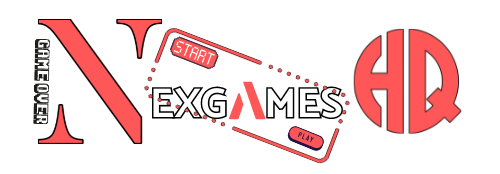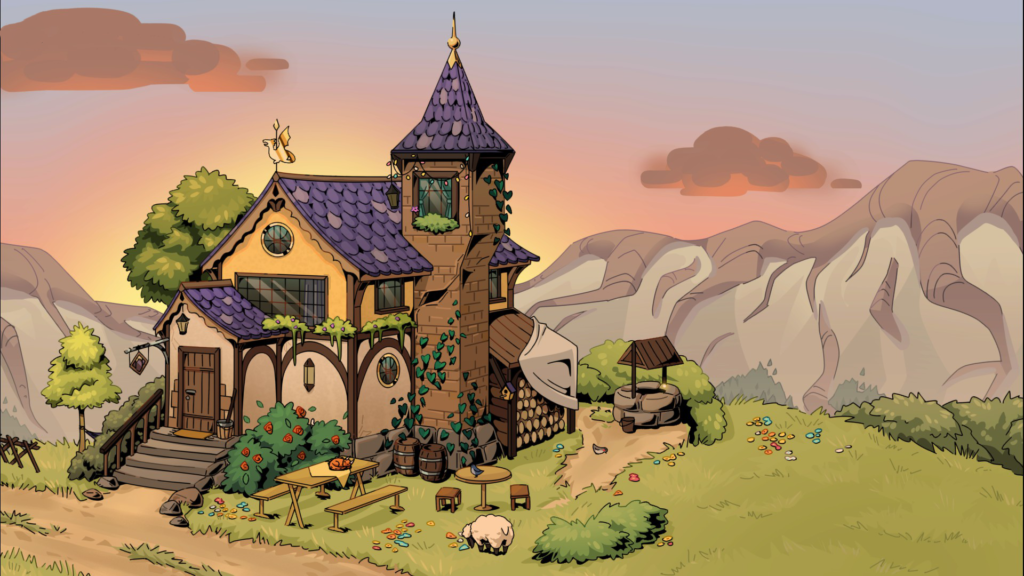
Initial release date: June 20, 2024
Platforms: Nintendo Switch, Microsoft Windows, Mac operating systems
Developer: Gentle Troll Entertainment
Genres: Visual novel, Adventure game, Indie game, Entertainment, Fantasy, Speculative fiction, Societal
Publisher: Gentle Troll Entertainment
Engine: Unity
In recent years, the cozy drinking simulator has been increasingly popular, beginning with 2020’s Coffee Talk and advancing to 2022’s VA-11 Hall-A and now 2024’s Tavern Talk. Each game usually follows the same formula: an intimate setting—a coffee shop, futuristic bar, or run-down tavern, for example—in which our character serves drinks in exchange for the visitor’s narrative or concerns. I’ll refer to the actors as ‘visitors’ because I don’t believe anyone ever compensated me for my services. This leads to a game that allows for broad narratives and character studies, which we as players can weigh in on in order to provide an unbiased, useful opinion. However, what struck out to me in Tavern Talk’s case was its lengthy runtime; it’s almost as if the genre is expanding, with lengths ranging from 5 hours to 10 and now to 15. This is undoubtedly in its favor, as it provides you more wiggle room to examine your customers’ demands and histories, as well as to experiment with new mechanics and systems, showcasing its drive to stand out in its genre.
Tavern Talk is a fantasy visual novel about the adventures of your many visitors in the kingdom of Asteria. As is customary in the genre, you bear witness to their hardships while offering them respite in your drink menu. To my delight, this cast of mythical beings is diverse, with none of the key characters missing significant growth or relevance. The developers even include cameos from other games, such as Polly and Scott from Monster Prom and Minthie and Quincey from The Lucky Gryphon. I didn’t understand these references until I glanced at the Kickstarter page, so think of these characters as amusing one-off episodes rather than crucial to the overall tale. Other characters include the conventional Elf and Vampire, as well as the more distinctive Echo and Seraph. Despite their disparate origins and ideologies, friendships and parties grow, resulting in a united group that bounces off each other in funny and endearing ways. You could even play matchmaker! Watching love blossom between unusual people. Another enriching component of this group is the dedication to representation and diversity, which should be commended for its smooth execution. Pronouns are always given in each character’s journal, and Minthie’s impairment is visible as two excellent doggos and discussed in relation to her writing profession.
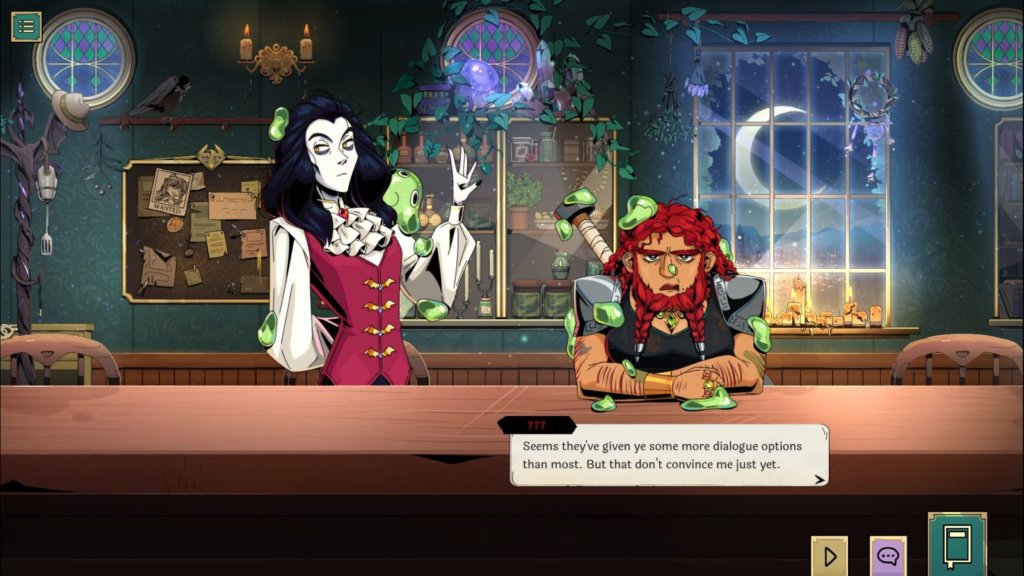
Each character has their own story, and watching how it unfolds in terms of the quests they accept and complete is really enjoyable. For example, the air echo Zephir begins the adventure emotionally disconnected and secretive, as is typical of a rogue character. However, when they complete additional quests with other party members, they gradually open up and begin to care about their comrades, creating bonds and working through their trauma. However, one potential flaw with this ensemble and their storylines is their simplicity and dependence on stereotypes. Tavern Talk indulges in its D&D inspiration, frequently assigning characters to their appropriate stereotype. Kyle the vampire is ostentatious, Rhea the dwarf is stubborn and aloof, and Clay the half-giant is gentle and calm. If you’re a fan of the genre, you’ll definitely roll your eyes at these blatant cliches, but in my experience with the game, I don’t think this is a bad thing or detracts from the experience. The game is full of tongue-in-cheek comedy, with frequent 4th wall breaks mocking its age rating and directly acknowledging statistics and proficiencies like strength or defense, which are bolstered by stereotypes. It also works well for a beginner audience, making it more accessible to individuals with less D&D experience. However, if they develop a sequel, additional nuance would be appreciated.
The Tavern keeper, the player’s stand-in, played an involved role in my initial game, rather than merely being an unbiased listener. As the story progresses, a mystery emerges about who you are, as guests are revealed to be old acquaintances and you are given a cryptic letter that you can’t bring yourself to open. This starts a character arc that doesn’t shy away from your character’s shortcomings and challenges if you have the authority to give counsel or encourage clients towards drink alternatives that have a direct impact on their quest. The underlying narrative culminates in these questions as you become enmeshed in the ramifications, but unfortunately, it does not pay off very well. The story’s villain is on a mission to destroy the world, and the game does a good job of building up to it, presenting consequences for your choices and risks. However, because you are tethered to your bar, the huge final battle feels underwhelming and ends abruptly, despite the fact that it was supposed to pump the player up.
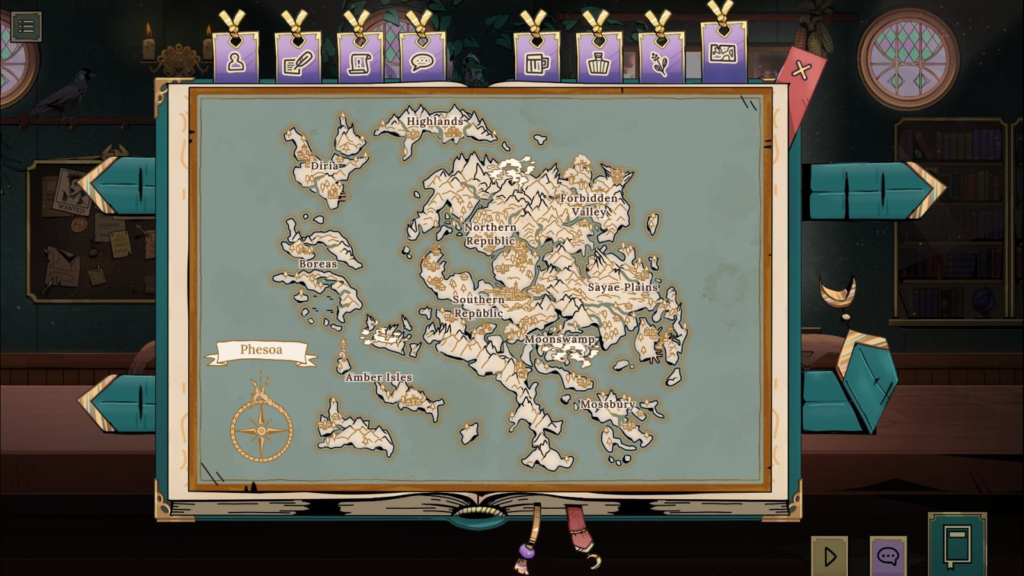
Tavern Talk’s worldbuilding is nothing short of extraordinary, with its attention to detail and commitment to the laws and history of the universe. Your logbook has reams of information; the most amazing feature is its vast map, which describes geography and locales in great detail. In the spirit of D&D, it does wonders in making the world feel real with its adventure and danger. This complements its extensive use of mythology, from the gods Leviathan and Cassiopeia to lesser characters such as the Banshee and Mari-Morgan. As a mythology lover, I enjoyed how they were used, much like small Easter eggs. Especially the Mari-morgan, who I immediately recognized as a resident of Welsh mythology—I love you and thank you, developers. There is a lot to dig into in Tavern Talk, as the environment is developed alongside the evolution of the narrative, captivating the player from start to finish with several strata to investigate if the player so desires.
Its environment and history are enhanced by a stunning art style, which captures the wonderful mood of the land of magic and adventure. Of course, you spend 99% of your time in your bar, but this solitary place is punctuated by weather changes, from snug stormy evenings to early daybreak. Events related to the plot include the outside of your bar being flooded and falling stars, which seem more aesthetically beautiful than they are in fact. These minor tweaks break up the monotony and add tone and atmosphere to the game. The inside of your surroundings also alters significantly as a result of trinkets brought back by your clients; a vampire clock is exactly what the shop needed to enhance its gothic look, thanks Zephir. Each character has their own entertaining and vibrantly colored design, ranging across diverse body types that are instantly distinguishable; I really wanted more and more characters to appear!
Tavern Talk’s main gameplay element is its drink-making system, which has 15 different recipes to pick from and includes a fusion system for more diversity. The game’s use of drinks differs from its predecessors in terms of story shaping and the ability to create various combos. It stands out from Coffee Talk’s three-ingredient guessing game (which might be frustrating due to not understanding how to prepare a specific drink) because you are given a recipe to imitate. The mixing method contains a sectioned jug into which you pour your liquids, a simple but sturdy pouring mechanism, and if you make a mistake, you may reset using your helpful dragon friend Andu as a bin, good boy? As you pour in each ingredient, your chart will fill up toward the required skill, and if you succeed, you will be able to serve your drink.
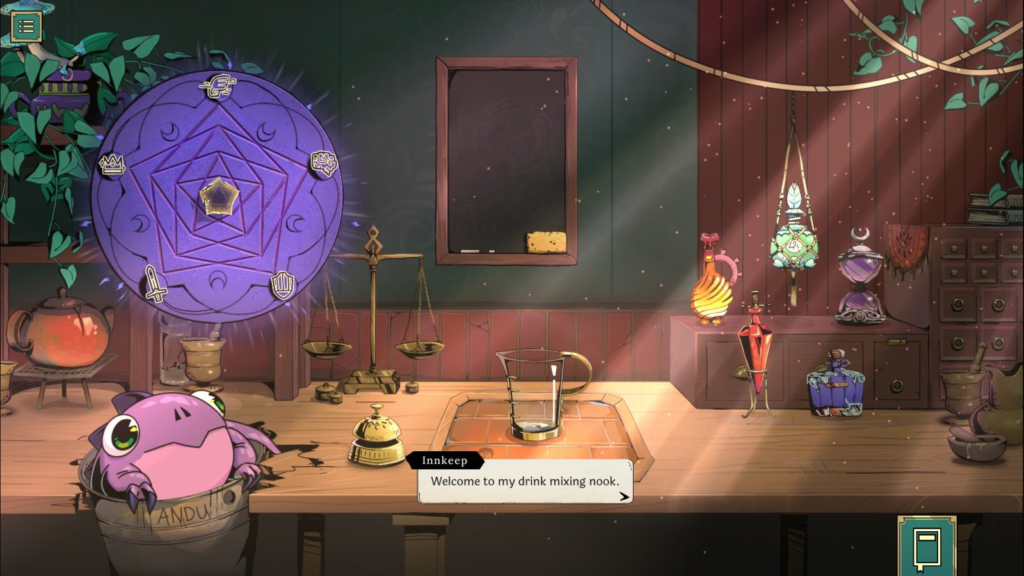
At the start of the game, you are given six beverages that correspond to buffs found in traditional D&D: agility, intellect, strength, defense, and charisma, which frequently correspond to the skills the consumer wishes to improve. This works well on the surface, as the drinks serve as a representation of their personality. Fable, a cautious and inexperienced explorer, prefers agility-style drinks to avoid detection or escape a dangerous scenario. Meanwhile, Caerlin is a confident huge sword wielder who prefers a more hands-on approach, hence his request for strength-based drinks. However, this frequently results in people sticking to their single beverage favorite, which can become tedious in practice. In the first half of the game, you start to turn off your brain when making cocktails because you’ve done it so many times with little wiggle space. To combat this, the game periodically updates your mixology with new cocktails that have the same stat increases. Frosted Lagoon is the normal defensive increase drink, but Steel Tonic will be added later to liven things up (pun intended) while still providing the same total stat.
Another interesting feature is the use of fusions, which are substances that contribute bonus points to each stat while also providing a unique talent that is related to the quest system, such as Draconic Light or Invisibility. These can help break up the monotony of making the same drinks, although they aren’t utilized as frequently as I would want. Some are just important to one quest and will never be seen again. Instead, it is up to the player to think outside the box and experiment with alternative combinations to obtain the same result as if the drink were created conventionally. Overall, the system is varied but has some potential for improvement. To the developer’s credit, their update roadmap includes more drink diversity and an attack on the repetitious Swift Strike, so I’m looking forward to some refining!
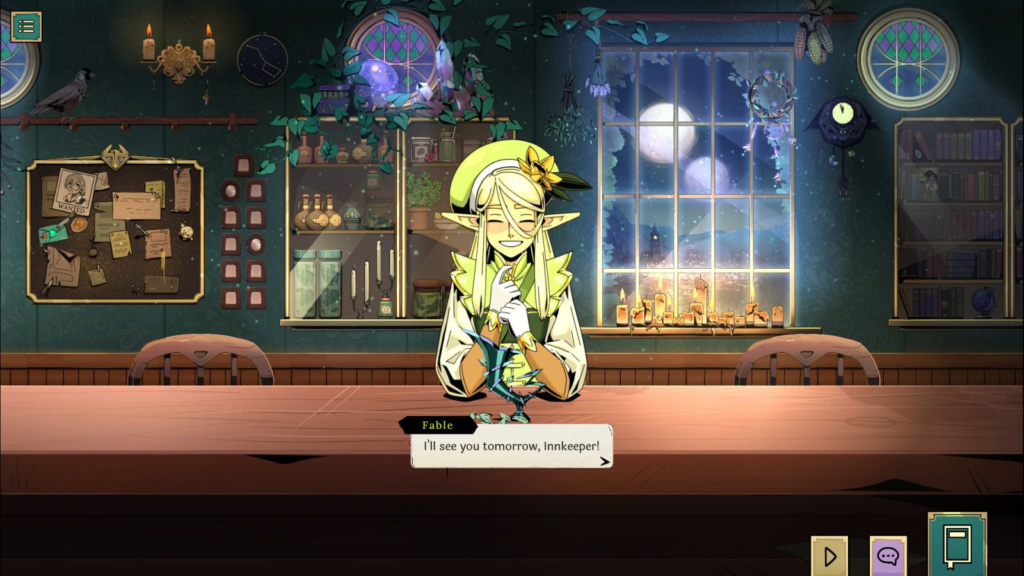
Finally, and completely unique to Tavern Talk, is the quest system, which distinguishes it as an entertaining piece of D&D media rather than just a pleasant drinking simulation. During your many talks with the game’s characters, they will gather up rumors based on their experiences and encounters. These show as notes in your notebook, which may appear incoherent at first but will gradually become more clear as you go through the game. Once you’ve acquired enough information, at the conclusion of the game day, you’ll be offered the choice of combining three appropriate notes to generate quests. Once these quests are created, you may post them on your tavern’s quest board for various characters to complete. This allows for interesting character encounters and fun stories to hear once they return, making the game’s world feel more alive and not limited to a single battle. This approach works nicely with the drinks mechanism because the beverages you offer to the character going on the mission will result in one of two results. Melli, for example, may request an agility drink with invisibility to slip by her opponent, while another alternative may be a charm drink with popularity to talk her way out of the problem. This provides the player with minimal player choice, which is sufficient to feel impactful and appreciated in its involvement; however, be cautious; the game divides these outcomes into successes and failures, narrowing your narrative path to a good or bad ending, raising the stakes of your involvement in your friends’ lives.
Review Overview
Gameplay – 77%
Story – 65%
Aesthetics – 80%
Content – 73%
Accessibility – 85%
Value – 78%
Overall Rating – 76%
Good
Summary: “Tavern Talk” is a cozy management sim that blends straightforward gameplay with light storytelling. Players will enjoy creating a warm, inviting atmosphere in their fantasy tavern, although the gameplay may feel repetitive over time due to limited task variety. The game’s visuals are charming and capture the essence of a cozy tavern, though they don’t push any graphical boundaries. While the narrative elements are immersive, they lack depth, leaving room for more substantial storytelling. Overall, “Tavern Talk” is accessible and enjoyable, offering good value for those seeking a relaxing and story-driven experience, even if it might not provide long-term replayability for everyone.
